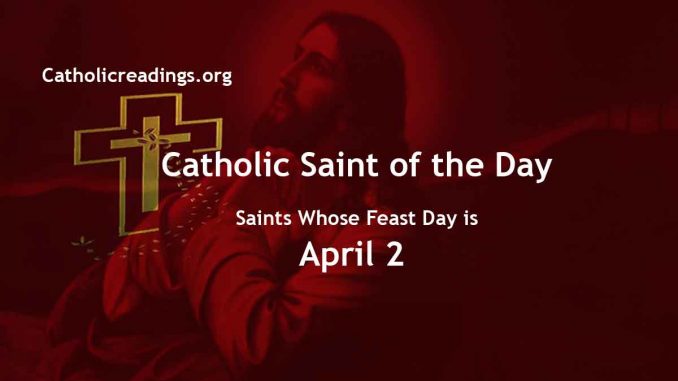This is the Saint of the Day list of Saints and Blesseds whose feast day is on April 2 2025.
👉 Saint Francis of Paola
Saint Pedro Calungsod
Blessed Vilmos Apor
Saint Francisco Coll Guitart
Blessed Mykolai Charnetskyi
Saint Appian of Caesarea
Saint John Payne
Saint Urban of Langres
Blessed Leopold of Gaiche
Blessed Arnulf of Leuven
Saint Ebbe the Younger
Saint Abundius of Como
Saint Eustace of Luxeuil
St Eustace of Luxeuil was also known as Eustasius, Eustatius, Eustathius, Eustache, Eustochius, or Eustachius.
He was a monk born in 560 AD and a spiritual student of St Columbanus. He was the head of the monastic school at Luxeuil Abbey.
Later, he became the abbot of Luxeuil in 611 AD. During his abbacy, the abbey had 600 monks and ran a seminary that sent many bishops and saints into the world. He was noted for his humility, lengthy fasts, and for spending his time either at work or prayer.
It is said that he healed Saint Sadalberga of blindness. He died in 629 AD.
Blessed Diego Luis de San Vitores-Alonso
Blessed Diego Luis de San Vitores-Alonso born on November 13 1627 in Burgos, Spain was a Jesuit missionary priest.
He founded the first Catholic church on the island of Guam and established the Spanish presence in the Mariana Islands.
He died on 2nd April 1672 in Tumon, Guam, and was beatified on 6th October 1985 by Pope John Paul II.
Saint Theodora of Tiria
Saint Theodora of Tiria also known as Theodora of Tyre, Theodora of Tyros, Theodora of Caesarea, Teodora or Theodosia was born in 290 AD in Tyre.
He was imprisoned, tortured, and executed in her late teens for encouraging other martyrs to not give up their faith. He died a martyr after being thrown into the sea to drown at Caesarea, Palestine in 317 AD.
Blessed Alessandrina of Foligno
Blessed Alessandrina of Foligno also known as Alexandrine or Sandrina born in 1385 in Sulmona, Italy was a poor Clare nun.
She founded the Poor Clare monastery in Foligno, Italy where she was admired for her great piety. She died on April 2 1458 of natural causes.
Blessed Drogo of Baume
Blessed Drogo of Baume also known as Drogon, Dreux, or Druon after leading a worldly and dissolute life, became a Benedictine monk at the abbeys of Fleury-sur-Loire and Baume-les-Messieurs in France.
He is noted for his piety. Around 950 AD, he received a vision of Saint Benedict of Nursia, confirming his conversion to religious life.
Saint Ðaminh Tuoc
Saint Ðaminh Tuoc also known as Domenico or Dominic was born in 1775 in Trung Lao, Nam Ðinh, Vietnam. He was a Dominican priest and died on April 2 1839 in Nam Ðinh, Vietnam.
He was canonized on June 19 1988 by Pope John Paul II and is celebrated on November 24 as one of the Martyrs of Vietnam.
Saint Brónach of Glen-Seichis
Saint Brónach of Glen-Seichis also known as Virgin of Glen-Seichis, Bromana, Bronacha, Bronanna, Bronagh or Bronaha was a nun and became abbess of Gleannsechis (Kill-sechis), Ireland.
Saint Nicetius of Lyon
Saint Nicetius of Lyon also known as Nicet, Nicetus, Nizier or Nicezio was the nephew of Saint Sacerdos of Lyons.
He was the bishop of Lyon, France in 553 AD and worked to revive ecclesiastical chant. He died in 573 AD of natural causes.
Blessed Meingosus of Weingarten
Blessed Meingosus of Weingarten also known as Megingaud or Meingos was a benedictine monk and became abbot of at Weingarten abbey in Swabia in modern Germany in 1188 AD. His representation is an abbot supervising construction.
Saint Lonochilus of Maine
Saint Lonochilus of Maine also known as Longis or Lenogisil was a priest and founded a monastery in Maine, France. He was the spiritual teacher of Saint Agnofleda of Maine. He died in 653 AD of natural causes.
Saint Agnofleda of Maine
Saint Agnofleda of Maine also known as Agneflette or Noflette born in Switzerland was a nun and spiritual student of Saint Lonochilus of Maine. He died in 638 AD of natural causes.
Saint Constantine of Scotland
Saint Constantine of Scotland was the king of Scotland. He died in the 874 battle fighting invading heathens and thus was considered a martyr. He is buried in Iona.
Saint Rufus of Glendalough
Saint Rufus of Glendalough also known as Rufin was a hermit at Glendalough, Ireland.
Saint Musa of Rome
Saint Musa of Rome was a young girl in 6th century Rome, Italy who had visions and mystical experiences. Saint Gregory the Great wrote about her.
Saint Victor of Capua
Saint Victor of Capua was the bishop of Capua, Italy in 541 AD. He was a noted ecclesiastical writer and died in 554 AD.
Saint Gordonian
Saint Gordonian also known as Gortonian, Gordian or Gurgoniana was a martyr.
Saint Magnus
Saint Magnus was a martyr.
Saint Donatus
Saint Donatus was a martyr.
Saint Julius
Saint Julius was a martyr.
Martyrs of Africa
Martyrs of Africa is a group of ten Christians martyred together in Africa at an unknown date. Their names are Marcellinus, Procula, Quiriacus, Regina, Satullus and Saturnin.
Martyrs of Thessalonica
Martyrs of Thessalonica was a group of sixteen Christians who were martyred together in Thessalonica in Greece at an unknown date.
Their names are Zonisus, Valerius, Urbanus, Theodoulus, Publius, Proculus, Mastisius, Julianus, Gagus, Dionysius, Cyriacus, Agatophus and Agapitus.
Other Saints of the Day for April 2 2025
- Titus the Miracle Worker
- Thetwif of Minden
- Polycarp of Alexandria
- Mary of Saint Joseph Alvarado
- Heinrich von Baumburg
- Gregory of Nicomedia
- Genoveva of Brabant
- Floberde
- Elizabeth Vendramini
- Conall of Clonallan
- Augustine of Ancona

Related Links
Powered By SEO Experts – Saint of the Day for April 2 2025
Follow @ReadingCatholic
